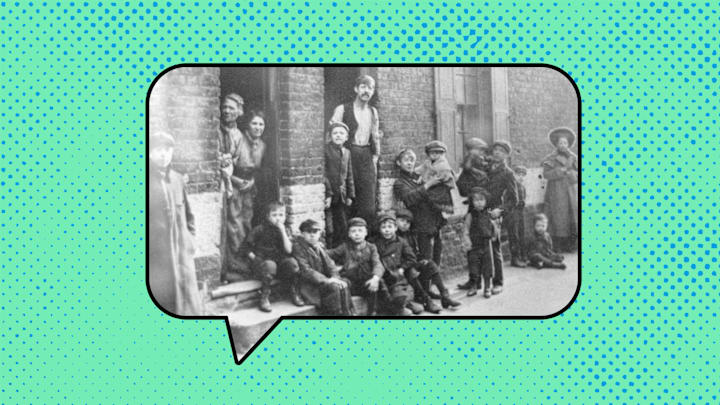Since the 16th century, the word Cockney has referred to a person born close enough to Mary-le-Bow church in London’s East End that they could hear the bells ring—and by the mid-1800s, Cockney culture had developed its own vernacular: rhyming slang, which the Oxford English Dictionary (OED) defines as jargon “in which a word is replaced by words or a phrase rhyming with it.” (Though to make things more confusing, sometimes the rhyming part of the phrase is omitted.) The first work to include a number of examples of Cockney rhyming slang was published in 1857 by a lexicographer named Ducange Anglicus.
Like a lot of lingo, Cockney rhyming slang arose as a form of code spoken between people who didn’t want listeners to know what they were talking about, whether they were the police or the customers of a costermonger. From there, it likely caught on due to its creativity and charm—you certainly don’t have to be a suit thief or a tailor to appreciate calling a suit a “bag of fruit” or a “whistle and flute.” In fact, so many Cockney slang terms have gone mainstream that you may have used one with your china plate (a.k.a. mate) without even knowing it. Today, rhyming slang remains one of those lovable oddities of the word world, like a lexical platypus.
1. Rats and Mice
Can you figure out this term’s meaning from the following example, written by Dashiell Hammett in 1929’s Dain Curse? “This Rhino Tingley’s carrying an eleven-hundred case roll. Minnie says he got it with the rats and mice.” Minnie wasn’t suggesting a situation that might require an exterminator, but simply that common tool of role players and gamblers: dice.
2. Mince Pie

Mince pie has referred to an eye in rhyming slang since at least the mid-1800s. (Well, they are both roundish.) An ad from 1989 uses the term to describe an understandable reaction to an unexpected grocery guest: “Flabbergasted grocer, George Gimpson, couldn’t believe his mince pies when an alien beamed into his shop.”
3. Plate of Meat

A plate of meat is something that, literally speaking, you wouldn’t want to find on this term’s actual meaning—the street. That sense has been recorded since the mid-1800s; the term can refer to the feet as well.
4. Rock of Ages
Since the early 1600s, the phrase rock of ages has referred to God or Christ. But in rhyming slang, the term has a more ungodly sense: wages. That meaning dates back to the 1930s, but a 2003 mention in London’s Sunday Express shows the term in use relatively recently: “Between you and me, the rude ones are often the best but this is a family newspaper so I’ll try to keep it clean or the editor will stop my rock of ages.”
5. God-forbid
Do you have any god-forbids? If so, you have kids. The logic of the term was described in J.R. Ware’s 1909 book Passing English of the Victorian Era: “God-forbids, kids—a cynical mode of describing children by poor men who dread a long family.” For more slang terms recorded by Ware, check out this list of Victorian slang.
6. Apples and Pears

Maybe the most famous example of Cockney rhyming slang, the term apples and pears refers to stairs. It’s been around since at least 1857, when it was recorded in Ducange Anglicus’s The vulgar tongue: comprising two glossaries of slang, cant and flash words and phrases, principally used in London at the present day. You can also say you “fell down the apples,” leaving out the rhyming half of this term—another hallmark of Cockney rhyming slang, per the OED.
7. Half-inch
Have you been half-inching again? Hope not, because that means stealing—or, specifically, pinching in rhyming slang. The term goes back to at least the late 1800s and appears in the 1891 book Man of World: “Father must be got out on bail. He has been half-inching again.”
8. Bees and Honey

Since at least 1892, bees and honey has been rhyming slang for money, the honey for which so many buzz. The term appeared in Jeffrey Ashford’s 1960 book Counsel for the Defence: “D’you reckon we’d waste good bees and honey on a slump like you for nothing.”
9. Fisherman’s Daughter
This term makes as much sense as any rhyming slang: the fisherman’s daughter is likely to be very familiar with water. The term pops up in Daniel William Barrett 1980 book Life and Work Among the Navies: “If he wants water, he makes a demand for ‘the fisherman's daughter’.”
10. Loaf of Bread

Since at least 1930, loaf of bread has been a synonym for dead. Wystan Hugh Auden and Christopher Isherwood’s 1935 book The Dog Beneath the Skin poetically uses the term: “O how I cried when Alice died The day we were to have wed! We never had our Roasted Duck And now she’s a Loaf of Bread.” Other rhyming terms for dead include brown bread.
11. Lump of Lead
The phrase lump of lead refers to your head. So does pound of lead, which, like apples and pears, is often shortened to just pound, omitting the rhyme.
12. Rogue and Villain
One of the most British of these British terms, rogue and villain refers to a shilling, and has since rhyming slang was first recorded in the mid-1800s. This term also made the journey from British slang to Australian slang.
13. Grasshoppers

Actual rogues and villains, when stealing shillings, should probably avoid grasshoppers—which is rhyming slang for coppers.
